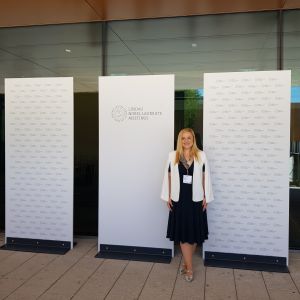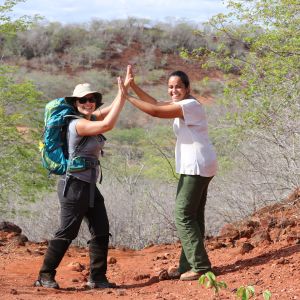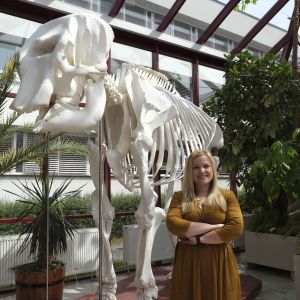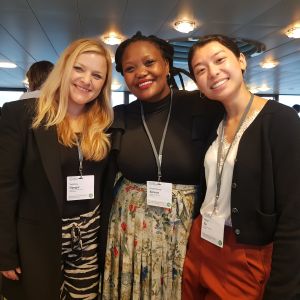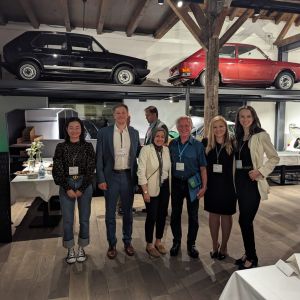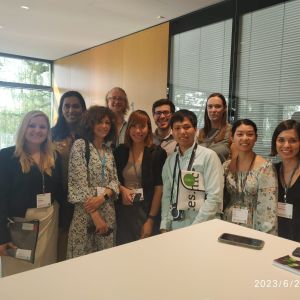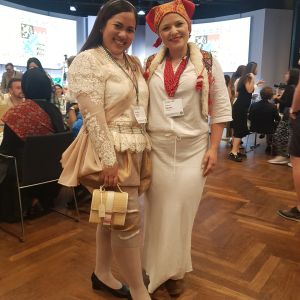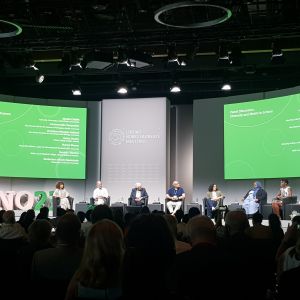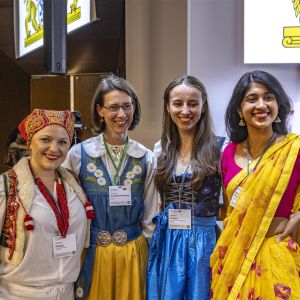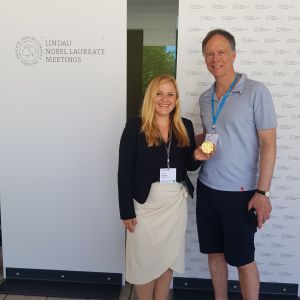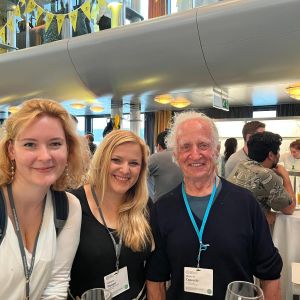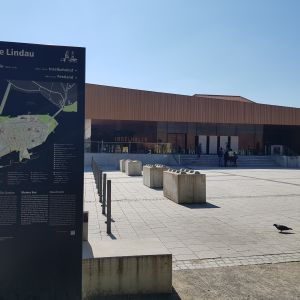Among the Nobel Prize laureates
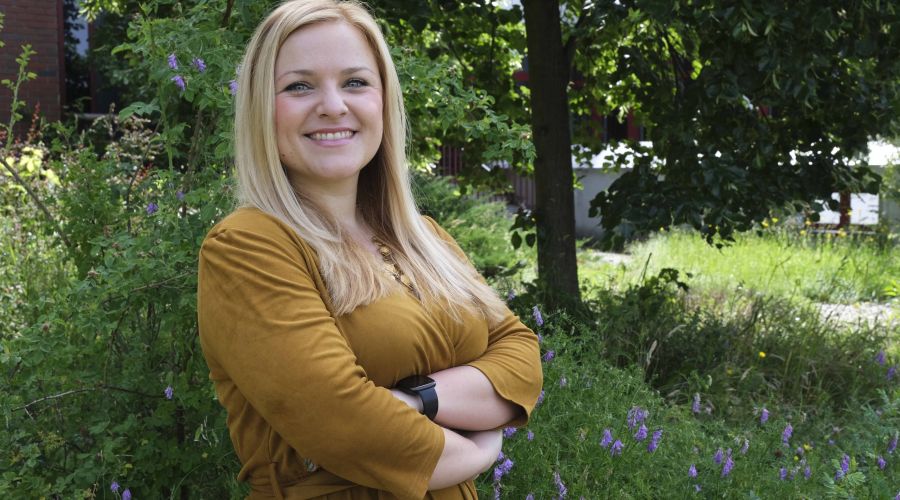
MSc. Vedrana Šlipogor, Ph.D., from the Department of Zoology (USB Faculty of Science) attended the 72nd meeting of Nobel Laureates in Lindau in June in the field of physiology/medicine. This prestigious annual event fosters the exchange of knowledge, ideas and experience among Nobel laureates and selected young scientists from around the world.
You did your doctoral studies and your first postdoctoral position at the University of Vienna. You were even awarded the L'ORÉAL-UNESCO Austria ‘For Women in Science’ postdoctoral fellowship there. Why did you decide to move to the Czech Republic?
This is correct, I conducted my doctoral studies in biology and my first postdoctoral position in cognitive biology at the University of Vienna, Austria. During my doctoral studies, I have started collaborating with Dr. Martina Konečná and her PhD students from the University of South Bohemia, on several aspects of common marmoset personality and its proximate mechanisms. Dr. Konečná is a renowned expert in personality, physiology and social behaviour, and has rich experience with non-human primate species, including Barbary macaques, Hanuman langurs, Western lowland gorillas and different Callithrichid monkey species. I was fortunate to win a competitive University of South Bohemia postdoctoral fellowship that allowed me to join her laboratory, and thus move to Czech Republic. For any young scientist, experiencing mobility is crucial, as it fosters knowledge exchange, starting new collaborations, getting access to new resources or facilities, getting a diversity of perspectives, living in a new cultural environment, all of which help a person to grow both as a scientist and as a person. Nowadays, it is actually very difficult in Austria and many other European countries to get a permanent position as a university professor, without significant previous experience abroad.
This is your third year in the Department of Zoology. You have already had research experience in Austria, France, and Brazil, so you have something to compare it with. How do you see the level of research at the University of South Bohemia?
University of South Bohemia has excellent level of research, and it hosts some remarkable world-class scientists, that I had a pleasure to meet during my time here. What I particularly appreciate regarding the scientific endeavors at the University of South Bohemia are the high levels of scientific rigor, statistical aptness, and productive discussions that I continuously witness in seminars and lab meetings. I consider myself lucky to be integrated in Martina Konečná’s lab, Radim Šumbera’s mole rat lab and Petr Vesely’s cognitive ecology community, so I am well-acquainted with the current research of these groups. Student training is also of very high quality and importance at the University of South Bohemia, and the Master's study programme in Ecology is particularly attractive for international students. While all the institutions I worked or interned at (in Austria, France and Brazil) had remarkable level of research and scientific excellence, the most international feeling I have experienced so far has been in Austria. At the Department of Behavioural and Cognitive Biology, University of Vienna, everyday communication as well as scientific and social events were all in English, which was beneficial both for foreigners and for the locals who visibly improved their language skills. This has translated in a lot of international collaborations, as well as winning best talk and best poster awards at conferences.
What do you do professionally? For example, can you briefly describe what you were interested in during your studies in Croatia, what did you subsequently move towards during your various internships, and what exactly you are doing now at our Department of Zoology?
Since I can remember, I have always been fascinated with the living world. I have always had an easy time learning biology, and looking back now it seems that I have always been a book-example of a budding ethologist, even though I have not realized it at that time: I would spend hours in a day observing animals and plants in the nature, or in the Zagreb zoo, where I first fell in love with Callithrichid primates. During my molecular biology bachelor studies in Croatia, I was very passionate about plant physiology and global climate change, and subsequently conducted bachelor thesis on the heat stress effect on pollen growth and germination. However, during my master studies, I took an elective course in Animal Behaviour and was immediately “hooked”. Luckily, Prof. Dr. Zoran Tadić who held this course recognized my high interest in the topic and recommended to do an internship in behavioural ecology with Prof. Dr. Cammille Bonneaud, at the CNRS station in Experimental Ecology in Moulis, France, where I conducted a study on personality traits in African clawed frogs. After this internship, I conducted two ERASMUS stays at the University of Vienna, where I got a thorough overview on the study of animal behaviour and comparative cognition, learned to work with common marmosets and subsequently conducted my master thesis on the topic of personality traits in common marmosets. During my doctoral research supervised by Prof. Dr. Thomas Bugnyar, and co-supervised by Asst. Prof. Dr. Jorg Massen, I have taken an integrative approach and studied theoretical and empirical aspects of personality and its links with learning in captive and wild common marmosets, which took me twice to Brazil where I conducted field studies with wild common marmosets (this research was even showcased in the BBC documentary series “Primates”). Currently at the Department of Zoology my research is centred around evolutionary questions in behavioural ecology, ethology and comparative cognition. In particular, I am investigating social and physiological aspects of personality in marmosets, and its links with learning in subterranean rodents (in particular, the USB-housed captive colony of naked mole-rats), under guidance of Dr. Martina Konečná and in collaboration with Prof. Dr. Radim Šumbera and his group.
And aside from science and research, how is life in České Budějovice?
Life in České Budějovice is very comfortable and slower in pace. I have only lived in big cities so far (Zagreb, Vienna, Recife), so it is truly refreshing to live in a town where one can literally be anywhere in the town in 15 minutes. The diversity of music, cultural, and culinary offers is remarkable for a town of this size, and Hluboka nad Vltavou and Česky Krumlov are just around the corner. If one needs more culture or action, Prague is very close, too. The diversity of nature in close vicinity to the town is astonishing, we often go for long walks around the area with our dog Nota. Czechs are quite active, so there are also a lot of different sport options. Apart from research, I joined a local improvisation theatre group and a yoga studio. However, the best thing about Budějce are its people – kind, friendly and witty. All of this makes Budějce pretty much an ideal place to live.
The Czech Republic is said to be the country with the lowest proportion of women in science and research in the EU. Do you see better times ahead in this respect? Do you think science needs more women and how can we support them?
I am hopeful that better times are indeed ahead in Czech Republic and other European countries facing similar problems, as various stakeholders at different levels are starting to recognize and act upon these issues, including policy makers, educational/research institutions, and funding bodies. Science needs more women and it needs more diversity in general, to be able to tap into a larger talent pool, to be able to get the most diverse perspectives, and to be able to tackle the most challenging research and societal questions. To do this, women need to get equal opportunities and support as men, more family-friendly policies should be implemented in the workplace (e.g., parental leave, childcare options, flexible working hours), networking and mentoring events and programs should be organized for female researchers for guidance and support, and more visible female role models should be present that will encourage young women in schools and universities to pursue scientific careers.
In June you attended the Nobelists' meeting in Lindau, Germany. How are the candidates for such a prestigious meeting actually selected?
The selection of Young Scientists who are invited to participate in the Lindau Nobel Laureate Meetings is a multi-step procedure lasting about half a year. First, a young researcher can apply to its academic partner institution within a country (i.e., in case of Czechia, this is Czech Academy of Sciences), can apply with its funding agency (i.e., in case of MSCA fellows), or can apply within an open call (i.e., if a country does not have an academic partner institution). At this stage, a person applies with several documents (CV, Letter of Motivation, Letters of Recommendation, etc.) for being considered for a nomination. The selection committee of the academic partner institution then reviews all applications and nominates a group of candidates to be forwarded for further selection to the organizing Council for the Lindau Nobel Laureate Meetings. The nominees then need to fill out a detailed online application containing personal information, education, academic and research experiences, list of academic achievements, including publications, conference presentations, service to the scientific community, awards, grants/fellowships obtained, Letter of Motivation, Letters of Recommendation, dedication to science and research and other extracurricular activities. In the months that follow, the nominee’s application is further evaluated in detail by the expert Lindau Council which selects the final list of participants, who are then, upon their successful evaluation, invited to join in the event taking place in Lindau, Germany. I was beyond thrilled to be selected as one of the 635 Young Scientists from all around the World to join in the 72nd Lindau Nobel Laureates Meeting in Physiology/Medicine, and it was truly a once in a lifetime experience.
The Nobel Prize is the highest standard for a scientist. How does it feel, in retrospect, to spend a few days among the best in your field, whom you may have only read about in biographies and memoirs?
It feels surreal, like the most wonderful dream. The whole Lindau Nobel Laureates Meeting is so well-planned and so well-organized, that participants have truly ample opportunities to interact and exchange with the Nobel Laurates and other Young Scientist from around the World on an unparallel level. I had a little notebook with me where I wrote all my notes from the event, and this notebook is now almost completely full of words of wisdom from the best and brightest in the field, both in terms of their science, but also in terms of their often-difficult paths, personal tragedies, and how they managed to get through life and continue with their science despite all of this. Their kind words of advice will serve as a reminder that the scientific path I chose will not be an easy one, but that it can and will continue to bring me joy if I maintain the same curiosity, rigour, passion, and kindness that I had on the beginning of this ride. I got a tremendous inspiration from this Meeting, and it was truly a privilege and honour to be selected to attend this event.
What does the programme of such a prestigious meeting actually look like? Your colleague from the Faculty of Arts, Jiří Kratochvíl, attended the meeting in 2019 and told us that he actually had the opportunity to speak face-to-face with individual laureates, for example, during individual walks. Which laureates did you talk to the most at the meeting?
The whole Lindau Nobel Laureates Meeting fosters the exchange of knowledge, ideas, and experiences between and among Nobel Laureates and Young Scientists, and revolves around several programme formats. In Nobel Lectures, Panel Discussions, Agora Talks and Life Lectures, Nobel Laureates take a center stage to address current research findings, talk about own historical achievements and life experiences, or raise awareness of and discuss fundamentally important issues (in some of these formats also on stage with Young Scientists). Next Gen Science sessions offers to a selection of participating Young Scientists the opportunity to present the core of their research. Open Exchanges, Science Walks and Laureate Lunches offer the opportunity to exchange face-to-face with Nobel Laureates, get an in-depth specialist analysis, their reflections on controversial topics, or ask them more personal questions, for instance on how they are managing the work-life balance. Partner Events and Science Breakfasts stimulate lively debates by all meeting participants, and they also offer ample opportunities to interact with the Nobel Laureates. Every evening hosts another social dinner, often followed with music and dancing.
What did you ask the Nobel laureates? Were any answers surprising to you or did they perhaps give you a completely new perspective on your research?
I truly enjoyed talking with Nobel Laureate Prof. Dr. Michael Levitt on the impact and future of artificial intelligence on innovation in science, technology and medicine, and on the advantages of using ChatGPT (i.e., for instance in self-teaching oneself to code). We got so involved in our conversation, that we completely lost track of the time and continued our conversation even long after the coffee break was finished, and the next scientific session was well under way. It was truly amazing and beyond inspiring scientific exchange!
Open Exchanges with Nobel Laureates Profs. Dr. Frances Arnold and Emmanuelle Charpentier left me speechless: both stroke me as incredibly brilliant, wise, genuine and kind. The rooms were so full during these exchanges, that many Young Scientists ended up sitting on the floor or were lined up in the hallway outside of the rooms, trying not to breathe too loudly to hear as much as possible. Prof. Dr. Frances Arnold gave such an inspiring and easy to understand lecture about her work, that everyone was in awe for enzymes for the rest of the conference! With Nobel Laureates Profs. Drs. John O’Keefe and Shwetak Patel I discussed more in-depth about the links between their and my research, and both of them gave me a new perspective and some brilliant advice on my research and future scientific endeavors.
Who was closest to you on the human level or professionally? Was there any scientific expert directly from your field? In your experience, is it true that the greater the expertise, the humbler and more modest the person?
In my experience, it really holds that the greater the expertise, the humbler and more modest the person – this is certainly true for all Nobel Laureates I interacted with, who were all open for exchanges and very kind, and particularly to Nobel Laureate Prof. Dr. Mario R. Capecchi, who I met on my first night in Lindau. On the first night I was invited to join the Summer Festival of Science, that was hosted by the German Federal Minister of Science and Research, Bettina Stark-Watzinger, with only 30 selected Young Scientists. Already on this first night, I was blown off my feet by being seated next to Prof. Dr. Capecchi. The whole night we talked about science, his Nobel discovery, and his incredible pathway in life from his earliest memories from orphanages and life on the streets of Italy during the World War II, through his move to the United States where he played in his uncle’s laboratory (his uncle was Dr. Edward Ramberg, a famous physicist who contributed to the early development of electron microscopy), to his work with his mentor Prof. Dr. James Watson (who received a Nobel Prize for the discoveries of the molecular structure of nucleic acids). We also talked a lot about my research - he was interested to know more about personality, cognition, common marmosets and the naked mole-rats. He shared his wisdom about the importance of scientific curiosity and creativity, but also about the value of physical activity and laughter at all life stages, to keep both the body and the mind young. His brilliance and charm were radiant, and by the end of the night several Young Scientists joined in the exchange. On the final day of the Lindau Nobel Laureates Meeting, all participants visited the Mainau Island for the final Panel Discussion and Science Picnic, and on the way back to Lindau there was a farewell party on the boat with lots of dancing. Prof. Capecchi and I met here again, had another scientific exchange, and ended the boat ride dancing together on the podium. This all was a truly amazing experience!
Did you establish any future scientific collaboration with colleagues who also attended the meeting?
I have established contacts with several colleagues from the United States, Switzerland, Germany and Thailand working in quite different, yet also related fields, and we talked about possible collaborations and exchanged our business cards and e-mail addresses (the organization team of the Lindau Nobel Laureates Meeting printed individual business cards for every participant, they clearly knew that collaborations are likely to start during the Meeting!). It was an incredibly welcoming and friendly environment; one could come up to anyone and strike up a conversation about their or any other research topic. Such scientific discourse and unique setting enabled productive exchange on an unparalleled level, and hopefully will help kick-start some collaborations with the future leaders in the field of physiology and medicine, from all around the World.
You have met many people in Lindau who have changed the world. It begs the question of what you might one day win the Nobel Prize for. However, the Nobel Prize winners themselves have often said that it's not really possible to predict anything like that in advance – they were usually surprised by the award themselves and say they were just in the right place at the right time...
Nobel Prize is a tremendous token of appreciation for the winning scientists on their work, but it is also incredibly important as it helps raise awareness of the general public about the value of science and the most pressing issues and discoveries of our time. Every good scientist does their research because they are curious and wants to discover more about the chosen research questions, they are innovative and think critically, they persevere in trying to answer these questions despite of the challenges and obstacles they face on the way, and they hope that this knowledge will eventually help make the World a better place. Once an important discovery is made, scientific community will likely recognize its importance, and there will be a subsequent domino-effect where its value will be acknowledged with scientific grants and awards, and perhaps even with the Nobel Prize. While there are many discoveries that are worthy of the Nobel Prize, it is difficult if not impossible to predict which one will actually receive it. Thus, us scientists should not conduct our work with the hope to possibly receive such an award one day, but listen to the wise advices of Nobel Laureates instead: follow own curiosity, ask interesting questions, think critically, conduct science rigorously, be innovative, creative and ready to problem-solve, collaborate with others, have ethical integrity, and communicate findings clearly both with other scientists and with the general public… and, who knows, maybe exactly these will one day lead to the big call from Stockholm.
If you want to know about MSc. Vedrana Šlipogor, Ph.D. and the Nobel Laureate meeting more, check out the interview with her - link will be added.
For information about other successful women in science at USB and interviews with them, see this link.
For the Czech version of the text, see the University Journal.
